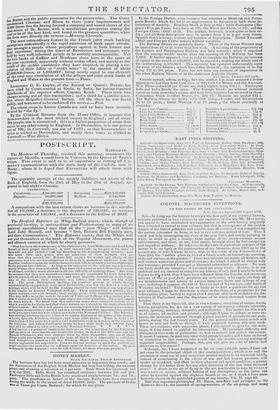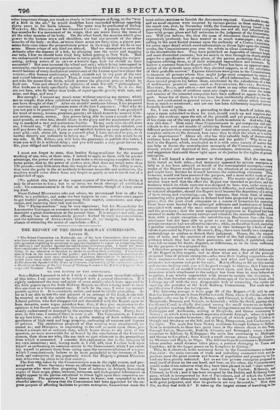COLONEL MACERONES INVENTIONS.
TO THE EDITOR OF THE SPECTATOR.
3, St. James's Sirtare, 2241 A ingest Ica SIR—In doing me the honour to review the first part of my eventful history, recently published in two volumes by the executors of the late Mr. .MACRONE. you appear to have overlooked my explanation of the work having originally been intended to extend to four volumes, but that in consequence of the sudden demise of the liberal publisher and amiable man M C It 0 NE, I was compelled b the parties interested to bring it out in tom volumes instead of four. Thus I could not help interrupting nay story at the year 1816, and merely, jumping to 1833, in order to give a scanty, faint outline of toy steam-carriage unique achievements, and their, to me, fatal result, brought about by foul conspiracy and impudent robbery. By reference to the table of contents or synopsis of the matter to be set forth in the continuation of Inv Memoirs, from 1H18 up to the present day, it will, I trust, be seen, that, in the words of the Coornicorator of June 231, the "author gives an idea of a future work, as interesting, amusing, rich, and various, as the present." These two volumes are nearly all written, and will contain numerous plates and diagrams; for which I intend to charge only one sovereign, provided I can get a thousand subscribed in advance. No man can fairly doubt my integrity ; it has stood too many trials. Resides, it is my ambition and my interest to complete any history, if only that I might he better known to thg, world, than I have been reflected from the fanciful and erroneous Mirrors of the ex post facto prophets, my reviewers; who sagely attribute all toy misadventures and misery to various imaginary faults and failings of my own, including, I suppose, the fall a Sir RAT and of N A1.01.1E0 N—the battle of Waterloo included ! Unless I am so lucky as to find a publisher for my two next volumes, I hope to distribute a sheet in the shape of a prospectus for the subscription plan; having to regret that I Was not able to do so before the dis- solution of Parliament and the departure of so many thousand readers from London.
Then there is my Opuscull, also in two volumes; consisting of essays, tracts, letters, pamphlets, &c. &c. on a vast variety of interesting subjects, scientific, moral, sporting, military, domestic, and industrial. The matter for this work is, of course, all written and printed ; although I have to collect, at some ex- pense, the materials, scattered through a great number of periodicals and pam- phlets, during the last twenty years. To the general reader every article will prove as new and fresh as though it were purposely written this very week. These two volumes, with numerous plates, I also intend to give fur one sove- reign, if I am forced to publish by subscription. My principal difficulty and dilemma in this mode of publication is, how to receive and collect the money. It must, I suppose, be paid into some third person's hands ; and I have no friend or connexion in this country who would take the trouble—to Say nothing of supposed responsibility. Perhaps, Sir, you can give toe a bit of advice and direction on this matter? Although, Sir, I have trespassed so far on your valuable space, I have not yet come to the principal object of this communication ; which is to call the attention of some one of your somewhat monied readers to an invention which, instead of contributing to the effects of war and bail human passions, will confer on mankind, and effect in their physical and moral condition, a greater change for the better than his any other discovery of the last three thousand years! I allude to the art of flying in the air, practicable to man by PCKELY MECHANICAL means, without balloon of any description ; as the latter can never be directed against the slightest breath of air, as I think I have satin- factorily shown in the published portion of my history, Vol. II. page 52. Had that ingenious philosopher Dr. HOOK, secretary and prompter to Sir Roesler Bavt.z, the inventor of spring-watches, of the airptimp, and mast
other important things, not stuck so closely in his attempts at flying, to the "way of a bird in the air," be would doubtless have succeeded without spending thirty years in his futile labours. The same may be predicated of Bishop Viten:a, Mr. Deacow, and Sir GEORGE CAYLEY. A pigeon, for instance, has muscles for Vie movement of its wings, that are seven times the mass of all the other muscles of its body. On the other hand, the muscles which give
...power to the human mars and shoulders, are but one-seventh of the other muscles of the body : so that, aeseven times seven are forty-nine, a pigeon pos. messes forty-nine times the proportionate power in its wings that we do in our arms. Hence wings of any kind are absurd. Had we attempted to cross the Atlantic after the manner of a fish, by plunging into the water and wagging our tails, I fear we should have tried long before getting to New York. Had we endeavoured to construct a machine to carry goods, by imitating the recipro eating, jerking action of an ox's or a horse's legs, how far should we have succeeded ? But man invented the wheel and axis; which being interrupted in continuity, can have no prototype in nature. Now let us think for a moment what would become of every mechanical contrivance of the human species without the WHEEL—this human contrivance, which existeth not in any part of the vast
and varied laboratory of nature? Thus, if man would cleave the air, he must not take his means from birds, which possess the physical powers which he lath not. Vain and absurd is the objection of some fire side " philosophers," that birds are in body specifically lighter than we are. Well, be it so: but are not bats, who fly better than birds, of equal specific gravity with rats, and nice, and dogs, and men ?
But enough : I cannot say much more without exposing my means; which are so simple, that when exhibited every body will exclaim, " Oh, who could not have thought of that !" After six months assiduous labour, I am prepared to convince any person of common sense of the fact I announce. "But why do you not put it in practice?" may cry out the lieges. Because I am paralyzed for want of money, leisure, premises, patent ; all which Cannot be secured with- out money, money, money. Any person being able to spare a couple of thou. sand pounds, or even less, should share in the glory and the emolument of giv- ing to mankind a new and portentous faculty. To any such who should meet me. I should say, "If after my demonstrations you feel perfectly satisfied, you will pay down the money ; if you are not satisfied, button up your pocket--keep your gold—and, above all, keep to yourself what I have revealed to you, so as neither directly nor indirectly to betray me." Thus, all the risk would be on any side. If, Mr. Editor, you will have the generosity to publish this letter, I trust you will do it without delay ; and you will confer a very great favour on, Sir, your obliged and humble servant,
MACERONT.
I must not forget to state, that besides flying-machines for the manual working of one, two, or three men, I intend to apply to them, with far greater advantage, the power of steam ; as I can make a steam-engine complete of two- horse power, that is, the power of sixteen men, that does not weigh more than 170 pounds—very little more than the weight of one man. The safety is such, that were the party in the air suddenly to become insensible and motionless, the machine would come down from any height AO gently us not to break one of a pocket-full of eggs.
[We publish this letter at the urgent request of the writer, as lie thinks it may be of service to him ; but in so doing we break through all established rule : his communication is in fact an advertisement, though of a very amus- ing kind. Since Colonel Macettom asks our advice, we recommend him to offer his MSS. to a publisher, and wake the best bargain he can: authors can't expect to get traders' profits, without possessing their capital, connexions, and expe- rience, and incurring their risk and trouble. The " Flying-machine" may be very ingenious; lint his Steam-boiler fur Locomotive Carriages on common roads is an invention of practical utility, and moreover a great desideratum at the present time. It is compact and safe, and its efficacy has been satisfactorily proved : bricked by such recommendation, and the testimony of ALE/CANT/ER. Goitnosr, it, we imagine, has the best chance of attracting the notice of capitalists.—En.]



























 Previous page
Previous page